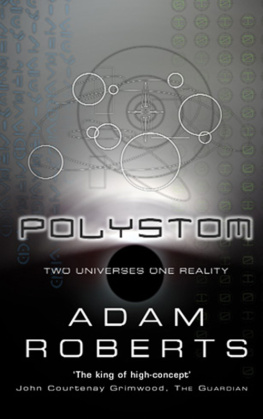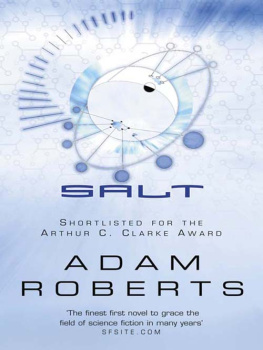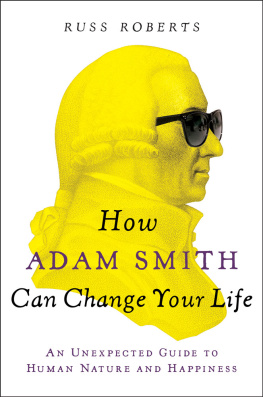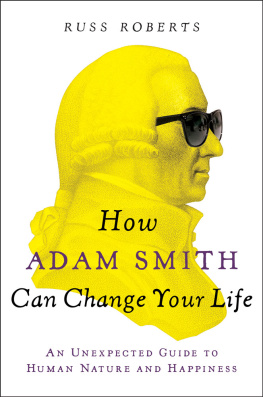Adam Roberts - Polystom
Here you can read online Adam Roberts - Polystom full text of the book (entire story) in english for free. Download pdf and epub, get meaning, cover and reviews about this ebook. year: 2004, publisher: Gollancz, genre: Art. Description of the work, (preface) as well as reviews are available. Best literature library LitArk.com created for fans of good reading and offers a wide selection of genres:
Romance novel
Science fiction
Adventure
Detective
Science
History
Home and family
Prose
Art
Politics
Computer
Non-fiction
Religion
Business
Children
Humor
Choose a favorite category and find really read worthwhile books. Enjoy immersion in the world of imagination, feel the emotions of the characters or learn something new for yourself, make an fascinating discovery.
- Book:Polystom
- Author:
- Publisher:Gollancz
- Genre:
- Year:2004
- Rating:3 / 5
- Favourites:Add to favourites
- Your mark:
- 60
- 1
- 2
- 3
- 4
- 5
Polystom: summary, description and annotation
We offer to read an annotation, description, summary or preface (depends on what the author of the book "Polystom" wrote himself). If you haven't found the necessary information about the book — write in the comments, we will try to find it.
Polystom — read online for free the complete book (whole text) full work
Below is the text of the book, divided by pages. System saving the place of the last page read, allows you to conveniently read the book "Polystom" online for free, without having to search again every time where you left off. Put a bookmark, and you can go to the page where you finished reading at any time.
Font size:
Interval:
Bookmark:
Id like to thank the following people for help and support during the writing of this novel: Simon Spanton for the economical excellence of his editorial work, as well as for his friendship; Malcolm Edwards; Malcolm Dixon, who read the manuscript; Steve Calcutt; Roger Levy; James Lovegrove; Bob Eaglestone, who disagreed with the physics of the Polystom world. Most of all, I would like to thank my wife Rachel, who read the manuscript and made many helpful suggestions.
I would also like to acknowledge one very particular debt. Gillian Allnutts exquisite collection of poetry Lintel (Blood-axe, 2001) provided me with general inspiration for this novel, as well as specific quotation. Polystoms own readings of Phanicles poetry are taken from three of Allnuts poems: turf, the opening of Tabitha and Lintel and Annunciation. These lines are quoted by kind permission of the author, and remain copyright to her.
This book is for Lily.
Polystom climbed into his biplane one morning, having made up his mind to fly to the moon. It had come to him upon waking, the sudden whim to visit his uncle Cleonicles the great Scientist Cleonicles, none other in his mansion on the moon. It so happened that Cleonicles, the revered old man, the great scientist, had only three days of life left to him. Polystom knew nothing of this, of course, any more than did Cleonicles himself. Our lives are so densely filled with the atomic particles of existence, perception, memory, that taken together they accumulate into a sort of haze, and this prevents us from seeing very far into the future. Not knowing that his uncle was mere days from a violent death, Polystom was happy as he dressed. War was an impossibly distant blur on the horizon, nothing more.
It was a dim morning, yellow clouds reducing the suns tack-head of light to a bleary focus of brightness. Far to the west, sunlight reflecting from the silvery rocks of the Neon Mountains seems artificially bright, throwing sharp black shadows long across the airfield. But apart from the silver-grey mistiness in the air the morning was good. Stom particularly liked the smell of the ground warming, a kind of acidic, gravelly, earthy smell. Like newly washed hair. He stopped and scratched his skull. The airfield reached flat to the line of trees, and then the forest swept away, before him, encircling the estate, reaching up and covering the hills in the middle distance. Beyond those hills the Neon Mountains rose in spectacular triangles and wedges of pure light. Look away, look up, and there was the deeply thrilling purple emptiness of the sky. Today, Stom thought to himself, it will be my sky.
...
[three lines missing]
... up the steps, the la[dder, and] into the cockpit. His leather [helmet] was here, where the servants had placed it, and he fitted it over his head, snapping the goggles into place. It required only a sharp action of his thumb down on the contact to start the propellers. A choked-sounding series of barks, and then the engine thrummed, a rising arc of sound, grumble to moan, screech, whine and the plane rolling and jogging over the turf. A hop into the air, jar the ground and up again. The propellers catching in the air like a comb snagging a tangle of hair, and pulling pulling Stom upwards, his spirit lifting in tandem with his body. He knew of no other sensation that came close to this. The thrill of lifting upwards.
He was up.
He circled, flew back over his own airfield, tipping the plane to one side to take in the view of the oblong runway, the sheds at the far end, and over to his house, its  -shaped magnificence (eighty rooms! As his co-father had boasted, many times nearly twice as big as Cousin Heras!). Then over that and there was nothing but woodland beneath him, trees and trees and away to the left the swordblade flash of sunlight on the water.
-shaped magnificence (eighty rooms! As his co-father had boasted, many times nearly twice as big as Cousin Heras!). Then over that and there was nothing but woodland beneath him, trees and trees and away to the left the swordblade flash of sunlight on the water.
The controls were sluggish, the wings still dew-soaked, and lift was elusive, but as Stom eased the stick back and flew a gentle upward spiral, they started to dry. Soon the whole biplane was humming. The fabric on its wings was drying and shrinking in the overblow of air, singing slightly, a high-pitched wail just audible over the rush of the wind. Stom wedged the fingers of his left-hand glove under his thigh, pulling the hand free, nude; he reached out with his free hand and touched the nearest of the wires that linked lower wing to upper wing in a crisscross of Xs. Twanged, it thrummed like a guitar string. He slipped the hand back into its glove.
He banked, and looked down upon his home. This time the house was a mere comma, his own extensive woods a bent stretch of dark green. Mostly he saw the snout of the Middenstead sea where it rounded in innumerable coves on the border of his estate. The water looked shining but depthless, a range of textures from smooth-lit to pewter-dappled white-grey. Another circle and spiral upwards through the air and the wood had reduced to a curled finger, and the whole of the Middenstead could be seen: sausage-shaped, nestling in amongst the perfect miniature details of mountains, splotches of forest, stamp-sized squares of cultivated land.
One last look. Goodbye! I leave my world behind.
That morning, as Nestor had brought him his breakfast on a tray, he had said Nestor, I think I shall visit Cleonicles today. Nestor had only said Very good, with that blank look in his eyes so characteristic of servants, and had held the tray out towards him. But once the idea was in Stoms mind it was as if he were possessed by it. He hadnt so much as touched his breakfast, had bounced out of bed. My silk underclothes, Nestor, if Im to be flying today. Very good, sir, immediately. Tell the mechanics to prepare the biplane. Which one, sir? The Pterodactyl. My favourite!
The plane is sprightlier now; Stom pulls back the long stick and sweeps upwards again, singing tunelessly in the sheer delight of it, an approximate operatic aria, except that he has no ear for music at all. Up and into the clarity of the blue sky. Surrendering himself to the great oceanic upper depths of the sky, up, up, up. Ortheen, he sings, orthe-e-e-en keleu-e-e-es, heeto dendron fai-ai-ai-ainetai! He remembers the words, but not the tune. When he next looks down he can see half a hemisphere, the whole of his estate and half a dozen other ones, the Middenstead and the Farrenstead seas, the scaly-looking chain of mountains stretching far to the west. The horizon still seems, by that strange trick of perception known to fliers and mountaineers, to be on a level with him, giving the panorama a weird, concave appearance, as if everything Stom owns is located in the base of a gigantic bowl. But an hour flying higher and the world has flipped round, bellied out. Now he can see the curve of the planet, the perfect arc marking off the browns and greens and blues of his world from the blue-purple of interplanetary space. One last look down, but now he couldnt even pick out the three-hundred-mile-length of the Middenstead sea amongst the variegated textures of the world below him.
The sun was still misty, a fingernail-sized smudge of brightness; the moon, forty times the diameter of the sun, glowed in the reflected light. Stom hauled his plane round, still singing, and positioned his nose straight at the heart of his destination. He pressed the engine-pedal down, and slipped the catch across it with his toe. The engines roared, heaved, and the plane started pulling towards the pockmarked green of the moon.
The interplanetary air was weirdly thin, breathable of course but not relishable. Some fashionable newsbook opinion pieces made great claims for the purity of it, even to the point of suggesting merely breathing it as a treatment for various ailments. But it always made Stom feel slightly headachy. Nothing too serious, but enough to take the edge off the experience. As air it was never quite enough for him, made his lungs labour in an asthmatic manner. It was extremely cold, of course. He buttoned up his Zunft flying jacket and pressed the button that warmed the heating coil in its back. The cold, unpleasant, started to recede, although his sinuses still stung with chill.
Font size:
Interval:
Bookmark:
Similar books «Polystom»
Look at similar books to Polystom. We have selected literature similar in name and meaning in the hope of providing readers with more options to find new, interesting, not yet read works.
Discussion, reviews of the book Polystom and just readers' own opinions. Leave your comments, write what you think about the work, its meaning or the main characters. Specify what exactly you liked and what you didn't like, and why you think so.









